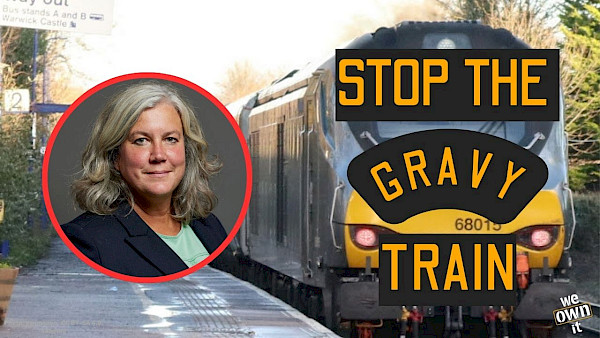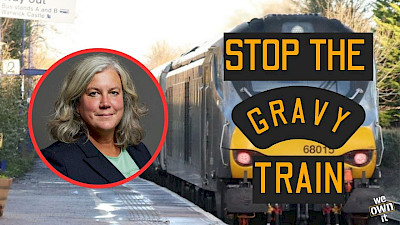
15 Apr 2025
Below is We Own It’s organisational response to the government’s Great British Railways consultation.
The government has recently passed the Passenger Railway Passenger (Public Ownership) Bill, which will see train operations gradually brought into public ownership as their current contracts expire.
This is brilliant news for passengers. There is strong cross-party support for rail in public ownership, and the government taking rail operations into public ownership is a strong recognition of this. Recent polling shows that public ownership of rail is supported by 76% of the British public. [1]
This is a crucial first step in setting our railway system on the right track. Public ownership of rail presents the government with a historic opportunity to refocus our railway system on the needs of passengers rather than on the profits of private shareholders from around the world. This means that the government should treat it as an occasion to correct other mistakes in how our railway system is run.
If public ownership of rail is seen as a failure, that will be very damaging. If the railways remain underfunded, still leaking money to the private sector, with key duties abandoned and an ineffective passenger voice, this is a serious risk. Therefore, to ensure public ownership of rail works, passengers very much hope to see the proposals below reflected in the Railways Bill that tabled before Parliament later this year.
In this consultation response, we outline four additional policies the government should adopt under Great British Railways (GBR) to make public ownership of rail a big success.
1. Reinstate key accessibility, environmental and socioeconomic duties
The Association of British Commuters and other disability advocacy groups have revealed that the government has removed GBR’s initial guiding principles set out by the Conservative government, namely, the duty to “maximise social and economic value”. [2] This duty meant that GBR would have to cater to, among other things, the needs of disabled persons and the environment.
Boris Johnson's government signed up to these basic duties, and the Sunak government, in its February 2024 draft Rail Reform Bill, affirmed them.[3] There is no valid reason for this government to remove those duties.
Parliament’s Transport Select Committee has written to the government to ask for clarity on the status of those key duties.[4] Transport minister Lord Hendy has responded [5] but has refused to reinstate these basic duties.
At a very basic level, all public services, including our railway, need to work for everyone who uses it, especially people who have accessibility needs. Furthermore, given the government’s commitment to achieve net-zero emissions by 2050, the duty to use the railway as a vehicle in the fight against climate change is a key one. The government should reinstate those key duties so that our railway, under GBR, is run in the public interest. Give GBR the duty to be accessible to everyone, have regard for the environment and promote other social and economic benefits that the railway can deliver.
2. Create Great British Trains - a publicly owned rolling stock company
Taking train operations into public ownership is the right thing to do. However, leaving the role of the private rolling stock companies completely intact is a mistake. The government should consider creating a publicly owned rolling stock company to gradually phase out the railway’s dependence on the profiteering private rolling stock companies.
This is normal in other countries, such as Germany and the USA, but perhaps more instructively, there are precedents in the UK, too, for the public sector buying trains directly to get the best deal.
In 2013, Transport for London said that private finance for Crossrail’s purchase of around 600 electric multiple-unit cars would be “complicated and expensive” and won approval to buy them directly instead.[6] More recently, the Liverpool City Region has opted to directly finance the purchase of 52 brand new Class 777 trains for Mersey Rail, rather than using private finance.[7]
The government should consider setting up a publicly-owned rolling stock company, which could be called Great British Trains, building on the successful branding of Great British Energy. This company would directly purchase and own all new trains in our railway system to replace privately owned ones as their current contracts end or as old trains are decommissioned.
A publicly owned rolling stock company could also consider manufacturing trains directly as well as repairing and maintaining trains. The aforementioned decision by Transport for London to directly purchase Crossrail’s trains, similarly involved the creation of 80 full-time jobs associated with a new maintenance depot to maintain those new trains. [8]
A single publicly owned rolling stock company would enable the government to do the type of system-wide planning that would avoid situations where newer Heathrow Connect electric trains were destroyed by private rolling stock companies because they do not suit the current infrastructure, while at the same time old trains are still being run. [9]
In the last 10 years, the private rolling stock companies have paid out around £3.6 billion in dividends to their shareholders, £360 million per average year. This money could instead be used to reduce passenger rail fares by 4.1%.[10] Alternatively, according to the RMT, rolling stock dividends between 2012 and 2018 could have paid for 700 new trains.[11]
Andrew Cumbers, Professor of Political Economy at Glasgow University’s Adam Smith Business School, is presenting a report to a Scottish Parliament event on Tuesday, 22nd April, where he will make a powerfully clear case for publicly owned rolling stock for Scotland. We encourage you to look into this report when it is available and explore the possibility of doing the same in England.
3. Give passengers a real voice in GBR
Great British Railways is a historic opportunity to put passengers in the driving seat in our railway system. Passengers should have a real say over what happens on the railway. Just as trade unions represent workers, the people who use the railway need their own organisation to represent them.
We Own It has proposed a model of 21st-century public ownership that makes our public services accountable to public service users, and we encourage you to consider adopting it for GBR [12]. This new model involves a number of key elements:
- Creating an independent organisation, or repurposing Transport Focus, to stand up for passengers as their watchdog.
- Great British Railways would have representatives from this passenger organisation on its boards nationally and regionally.
- Passengers should be enabled to register and join that watchdog organisation as members.
- The members of this passenger organisation (that is, passengers) should be able to vote for its leadership. Decision-making would be transparent, with open meetings and data, enabling passengers to contribute their ideas and experiences to improve the railway system.
This approach will ensure that the passenger watchdog stands up for the interests of passengers, rather than simply rubber-stamping government plans.
4. Back reforms with proper investment
Our railway system has historically been starved of investment, and as a result is lagging behind the top railway systems in Europe. Switzerland, which consistently appears at the top of railway rankings [13], invests around €477 per capita into their railway system. Britain invests around €116.[14]
Britain cannot get a Switzerland-quality railway without comparable levels of investment.
This investment will enable the government to invest in rebuilding track, expanding electrification, upgrading ageing rolling stock, etc. These will reduce the incidence of cancellations and delays, which frequently cause nightmares for passengers in our railway.
Very importantly, it will enable the government to cut rail fares for passengers, which will incentivise more people to ditch their cars and use the railway. This would have enormous benefits for our environment.
The government should consider a policy of investing a minimum of 0.5% of GDP in the railway system every year, which will take government spending on the railway from £12.5 billion last year to £14 billion. Switzerland invests 0.63% of the country’s GDP on rail infrastructure per year.
Investment also pays for itself. £2 of economic activity is created in the British economy as a result of every £1 the government invests in the railway system. [15]
Conclusion:
Reinstating key public interest duties for our railway, creating a publicly owned rolling stock company, giving passengers a real voice in GBR and properly funding our railway system will give public ownership of rail the best chance of succeeding. Without adopting policies that embed the public interest across the railway, not just in rail operations, the government risks failing the public by not fully implementing public ownership of rail.
The government should treat the Railways Bill as a historic chance to reorient our railway system so that it works for passengers, the economy and the country as a whole rather than just working for shareholders across the world.
If you agree with these demands, you have until midnight today (Tuesday, 15th April 2025) to send our response to the government’s consultation by clicking this link: https://weownit.org.uk/act-now/great-british-railways-public-interest-duty-respond-to-the-consultation
References:
1. https://weownit.org.uk/why-public-ownership/support-public-ownership
2. https://abcommuters.com/2025/02/24/dept-for-transport-drops-main-public-interest-duties-from-gbr-in-major-step-back-for-accessibility-and-environment/
3. https://assets.publishing.service.gov.uk/media/65e6e08e7bc3290adab8c18f/draft-rail-reform-bill.pdf
4. https://committees.parliament.uk/publications/47039/documents/243211/default/
5. https://committees.parliament.uk/publications/47449/documents/246154/default/
6. https://www.theguardian.com/uk/2011/dec/11/crossrail-funding-boris-johnson
7. https://www.railadvent.co.uk/2023/12/publicly-owned-class-777-trains-now-running-on-all-on-merseyrail-lines.html
8. https://www.gov.uk/government/news/crossrail-rolling-stock-and-depot-contract-to-be-awarded-to-bombardier
9. https://www.passengertransport.co.uk/2024/11/roscos-are-rolling-in-it-so-why-not-act/
10. https://weownit.org.uk/news/research-huge-train-company-dividends-could-fund-passenger-fares-freeze/
11. https://www.rmt.org.uk/news/publications/the-rosco-racket-why-its-time-to-take-control-of-uk-rolling/
12. https://www.opendemocracy.net/en/oureconomy/when-we-own-it-model-public-ownership-transport-21st-century/
13. https://www.transportenvironment.org/uploads/files/Embargo-lifted-09122024-European-Ranking-of-Rail-operators-REPORT-Updated-20122024-2.pdf
14. https://www.statista.com/statistics/1414740/per-capita-investment-in-rail-infrastructure-europe/
15. https://www.oxfordeconomics.com/resource/The-economic-contribution-of-UK-rail/

